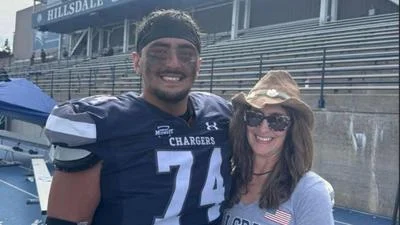Commander Ernest "E.J." Errico of the Veterans of Foreign War (VFW) Post 5788 in Lockport says that despite the gesture made by National Football League players this past Sunday to honor veterans in light of Veterans Day makes no difference – Post 5788 will continue to ban broadcasts of NFL games.
"They already showed their true colors," Errico told Chicago City Wire.
The VFW post started banning NFL broadcasts in September. Instead, Errico said the post has been showing NASCAR races, National Hockey League games and old Westerns. He said that business has actually picked up – a biker group has started to come in – and he's received a lot of calls and even donations in support of the action.

Lockport VFW Post 5788 Commander Ernest Errico
| Photo courtesy Ernest Errico
"I've gotten calls from VFW and (American) Legion posts all over the country telling me they are following our lead," he said.
According to news reports, nearly all the players who had been kneeling during the playing of the national anthem stood this past Sunday in honor of the vets. At the same time, the Washington Times reported that those who believe the protests disrespect the flag and the military were inspired by Veterans Day to strike back against the NFL. In one instance, a Facebook page called “Boycott the NFL,” with more than 227,000 followers, asked football fans to skip watching Sunday’s games “in solidarity with veterans around the country."
The standoff between the players and the NFL shows no sign of ending. And disciplining the players in an attempt to reverse loss of viewership, and the now the reported loss of business by some sponsors, stands on shaky legal ground, sports law experts say.
Paul Haagen, who teaches a class on sports and the law at Duke University Law School, said that it boils down to how to characterize the protests under the law: whether the actions fall under game management or if they would be considered a work condition.
“If it’s game management, then the league has plenary power,” Haagen said. “But if it’s a work condition, then it falls under federal labor law and has to be taken up in collective bargaining.”
And a collective bargaining issue would take precedence over league rules which are, nonetheless, clear about how players should conduct themselves during the playing of the anthem, Haagen and others say. The NFL game operations section states: “During the national anthem, players on the field and bench area should stand at attention, face the flag, hold helmets in their left hand and refrain from talking.”
The section continues: "It should be pointed out to players and coaches that we continue to be judged by the public in this area of respect for the flag and our country. Failure to be on the field by the start of the national anthem may result in discipline, such as fines, suspensions, and/or the forfeiture of draft choice(s) for violations of the above, including first offenses.”
The players didn’t always appear on the field during the playing of the national anthem. Before 2009, players in prime-time games would remain inside the locker room during the anthem, but Brian McCarthy, spokesman for the NFL, said it had nothing to do with league rules. The networks preferred having the players run onto the field after the singing of the anthem. That changed in 2009. Players appeared on the sidelines for the anthem during prime-time games, just as they had been doing all along for Sunday afternoon games. Many viewers may not have noticed the difference, McCarthy said.
Mike Mitten, who teaches sports law at Marquette University Law School, said that he believes collective bargaining would cover players’ actions during the playing of the anthem.
“Any discipline over the anthem would have to fall within the procedural range of other disciplinary acts as spelled in the collective bargaining agreement,” Mitten said. “In this case, the league would not have right to fine, reduce salaries or force a player to sit during the game. Undoubtedly there would be a grievance filed if they did.”
But he disagrees with any suggestion that the players are exercising their First Amendment rights to free speech.
“If it were a publicly funded college then they could look to the Constitution,” he said. “But this a private league. The constitutional right to free speech doesn’t hold.”
Meanwhile, business and viewership is suffering. The Sporting News recently reported that "NFL game telecasts averaged 14.772 million viewers during the first eight weeks of the season, according to Nielsen data obtained by Sporting News. That figure is down 5 percent from 15.549 million viewers during the first half of the 2016 season and off 18.7 percent from 18.167 million viewers for the same period in 2015.”
And a recent poll by Seton Hall University showed nearly a third of respondents said they were watching fewer games this season, and that 52 percent of those watching less gave the reason as players protesting the national anthem.
Finally, Adweek recently reported that Linda Yaccarino, chairman of advertising sales and client partnerships for NBCUniversal, said at a recent meeting at the New York offices of digital media agency R/GA that none of NBCUniversal’s NFL advertisers have pulled out of NBC’s "Sunday Night Football" or its "Thursday Night Football" games.
However, she said that a “list of advertisers have made themselves very clear that if you continue covering the political coverage of the issue, we will not be part of the NFL.”
For Ernest Errico, nothing will bring the games back on TV at Post 5788.
"When they were over in England standing for the queen but kneeling for the flag I would have volunteered to pack their stuff and pay to send it over if they would just stay there," he said.






 Alerts Sign-up
Alerts Sign-up